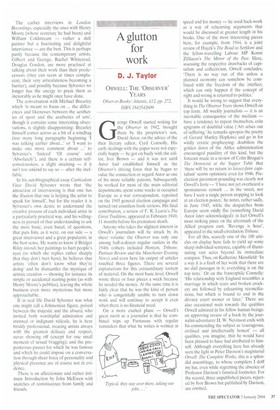A glutton for work
D. J. Taylor
ORWELL: THE 'OBSERVER' YEARS Observer Books/ Atlantic, £12, pp. 272, ISBN 1843542609 George Orwell started writing for the Observer in 1942, brought there by the proprietor's son, David Astor, on the advice of the then literary editor, Cyril Connolly. His early dealings with the paper were not especially happy — he got on badly with the editor, Ivor Brown — and it was not until Astor had established himself as the Observer's driving force that he began to value the connection or regard Astor as one of his more reliable patrons. Subsequently he worked for most of the main editorial departments, spent some weeks in occupied Europe as a war correspondent, reported on the 1945 general election campaign and turned out countless book reviews. His final contribution, a review of F. R. Lcavis's The Great Tradition, appeared in February 1949, 11 months before his premature death.
Anyone who takes the slightest interest in Orwell's journalism will be struck by its sheer volume: the Observer was only one among half-a-dozen regular outlets in the 1940s (others included Horizon, Tribune, Partisan Review and the Manchester Evening News) and even here his output of articles touched three figures. There are several explanations for this extraordinary torrent of material. On the most basic level. Orwell wrote three or four pieces a week because he needed the money. At the same time it is fairly clear that he was the kind of person who is congenitally unable to turn down work and will continue to accept it even when there is no financial need.
On a more exalted plane — Orwell's great merit as a journalist is that he combined trips up Parnassus with regular reminders that what he writes is written at speed and for money — he used hack-work as a way of rehearsing arguments that would be discussed at greater length in his books. One of the most interesting pieces here, for example, from 1944, is a joint review of Hayek's The Road to Serfdom and the fellow-travelling Labour MP Konni Zilliacus's The Mirror of the Past. Here, assessing the respective drawbacks of capitalism and collectivism, Orwell concludes, 'There is no way out of this unless a planned economy can somehow be combined with the freedom of the intellect, which can only happen if the concept of right and wrong is returned to politics.'
It would be wrong to suggest that everything in The Observer Years shows Orwell on top form. All weekly journalists — it is an inevitable consequence of the medium — have a tendency to repeat themselves, coin epigrams of doubtful value (Art arises out of suffering,' he remarks apropos the poetryof Gerard Manley Hopkins) and go in for wildly erratic prophesying: doubtless the golden dawn of the Attlee administration encouraged punditry of this kind, but the forecast made in a review of Colm Brogan's The Democrat at the Supper Table that 'there will be no return to laissez-faire capitalism' seems optimistic even for 1946. Preelection pavement-pounding was clearly not Orwell's forte — 'I have not yet overheard a spontaneous remark ... in the street, nor have I seen a single person stopping to look at an election poster,' he notes, rather sadly, in June 1945, while the despatches from Europe seem oddly flat (something David Astor later acknowledged): in fact Orwell's most striking piece on the aftermath of the Allied progress east, 'Revenge is Sour', appeared in the small-circulation Tribune.
For all this, scarcely one of the 100 articles on display here fails to yield up some sharp individual sentence, capable of illuminating vast acres beyond its immediate compass. Thus, on Katherine Mansfield: 'In a way it is a fault of her work that there are no dull passages in it; everything is on the top note.' Or on the francophile Connolly: 'His relationship with England resembles a marriage in which tears and broken crockery are followed by exhausting reconciliations, but which is bound to end in the divorce court sooner or later.' There are also occasional nods towards the qualities Orwell admired in his fellow human beings: an approving review of a book by the journalist-adventurer H. W. Nevinson ends with his commending the subject as 'courageous, civilised and intellectually honest' — all qualities, you imagine, that he would have been pleased to have had attributed to himself. Although everything here has already seen the light in Peter Davison's magisterial Orwell: The Complete Works, this is a splendid assemblage, to whose compilers I doff my hat, even while regretting the absence of Professor Davison's fanatical footnotes. For the record, three unpublished pieces, rejected by Ivor Brown but published by Davison, are omitted.


























































 Previous page
Previous page